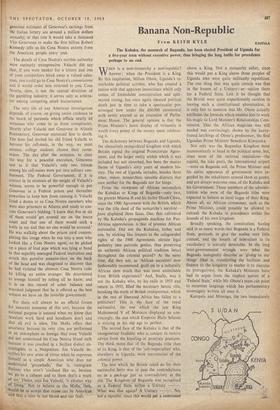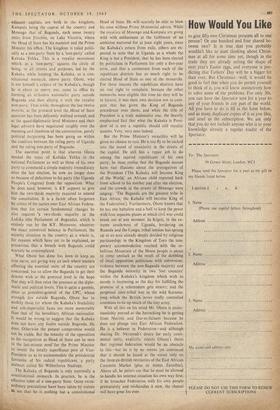Banana Non-Republic
The Kabaka, the monarch of Buganda, has been elected President of Uganda for a five-year term without executive power, thus bringing the long battle for precedence perhaps to an end.
WHEN is a non-monarchy a non:republic? Answer: when the President is a King. By this inspiration, Milton Obote, Uganda's re- markable political acrobat, who has created a nation with that apparent insouciance which only comes of formidable concentration and split- second timing, has once again cheated political death just in time to take a spectacular pre- arranged bow under the £60,000 ceremonial arch newly erected as an extension of Parlia- ment House. The general opinion is that the Prime Minister's latest display of virtuosity is worth every penny of the money spent celebrat- ing it.
The dichotomy between Buganda and Uganda, the obsessively monarchical kingdom with which Britain signed the original Protectorate Agree- ment, and the larger entity within which it was included but not absorbed, has been the master theme of Uganda's sixty years of modern his- tory. The rest of Uganda includes, besides three other, minor, monarchies, sizeable districts that care neither for the Baganda nor for kings.
From the viewpoint of African nationalists the Kabakas or Kings of Buganda—only two, the present Mutesa II and his father Daudi Chwa, since the 1900 Agreement with the British, which was the title deed of the monarchy's survival— ,have displayed three faces. One, that, cultivated by the Kabaka's propaganda machine for Pan- African appreciation, is that of premier African nationalist. Did not the Kabakas, father and son, by sticking like limpets to the safeguarded rights of, the 1900 Agreement, elevate legal pedantry into patriotic genius, thus preserving an authentic African political tradition intact throughout the colonial period? At the same time, did they not, as 'African socialists' now fashionably recommend, graft on to a culturally African stem much that was most assimilable from British experience? And, finally, was it not the Kabaka who, by his exile in 1953 and return in 1955, filled the necessary heroic role, breaking the myth of British omnipotence, which in the rest of liberated Africa has fallen to a politician? This is the face of the royal nationalist, the one which the late King Mohammed V of Morocco displayed so con- vincingly, the one which Emperor Haile Selassie is striving in his old age to perfect.
The second face of the Kabaka is that of the unregenerate feudalist who is content to receive advice from the kneeling or prostrate positions. The third, more that of the Baganda tribe than of its King, is that of the 'sub-imperialists' who, elsewhere in Uganda, were mercenaries of the colonial power.
The best which the British could do for their nationalist heirs was to pass the contradictions on in a package just as contradictory as the old. The Kingdom of Buganda was recognised
as a Federal State within a Unitary - .
What was that again? A Unitary --- No.
not a republic, since this would put a commoner above a King. Not a monarchy either, since this would put a King above those peoples of Uganda who were quite militantly republican. The one thing that was quite certain was that in the bosom of a Unitary—er—nation there lay a Federal State. Lest it be thought that the British were quite unpardonably careless in leaving such a constitutional abomination, it is only fair to mention that Mr. Obote actually attributes the formula which enables him to work his magic to Lord Munster's Relationships Com- mission. That the African magician was still needed was convincingly shown by the heavy- footed lurchings of Obote's predecessor, the first Ugandan Prime Minister Benedicto Kiwanuka.
Not only was the Bugandan Kingdom most inconveniently at hand in the political sense, but, since most of the national institutions—the capital, the lake ports, the international airport —were on Buganda soil, the Prime Minister and his entire apparatus of government were re- garded by the inhabitants around them as guests, and not always welcome ones, of the Kabaka and his Government. Those members of the adminis- tration who were of the Baganda tribe were expected to behave as loyal lieges of their King. Above all, no African commoner, such as the Prime Minister, could possibly be allowed to outrank the Kabaka in precedence within the bounds of his own kingdom.
Broadly speaking, the constitution, having said in so many words that Buganda is a Federal State, proceeds to give the notion very little content, and the breath of federalism in its vocabulary is scarcely detectable. In the long inter-governmental wrangle over what the Baganda inelegantly describe as `giving us our things' (that is, transferring the facilities and finance to the kingdom to enable it to exercise its prerogatives), the Kabaka's Ministers have - had to argue from the implicit nature of a `Federal State,' while Mr. Obote's team can point to recurrent language which has parliamentary sovereignty written all over it.
Kampala and Mmengo, the two immediately adjacent capitals, are both in the kingdom, Kampala being the capital of the country and Mmengo that of Buganda, each some twenty miles from Entebbe, on Lake Victoria, where the Head of State has his mansion and the Prime Minister his office. The kingdom is ruled politi- cally as a one-party State by a 'non-party' called Kabaka Yekka. This is a royalist movement which, as a 'non-party,' squares the circle of being, to all intents and purposes, led by the Kabaka while keeping the Kabaka, as a con- stitutional monarch, above party. Obote, who is not himself a subject of the Kabaka's, though he is about to marry one, came to office by forming an orthodox nationalist party outside Buganda and then allying it with the royalist non-party. Thus while, throughout the last twelve months; at the protocol level the Head of State question has been delicately waltzed around, and at the quasi-diplomatic level Ministers and their legal advisers have negotiated toughly over the meaning and intention of the constitution, purely political bargaining has been going on within the coalition between the ruling party of Uganda and the ruling non-party of Buganda.
The essential point is that whereas Obote needed the votes of Kabaka Yekka in the national Parliament as well as those of his own party to command a simple majority immediately after the last election, he now no longer does so because of defections to his party (the Uganda People's Congress) from the opposition. What he does need, however, is KY support to give him the two-thirds majority required to amend the constitution. It is a factor often forgotten by critics of his tactics over East African Federa- tion that for certain fundamental changes he also requires 'a two-thirds majority in the Lukiko (the Parliament of Buganda), which is entirely run by the KY. Moreover, whatever the exact numerical balance in Parliament, the security situation in the country as a whole is, for reasons which have yet to be explained, so precarious that a breach with Buganda could scarcely be contemplated.
What Obote has done has been to keep an iron nerve, not giving way an inch where matters affecting the essential unity of the country are concerned, but to allow the Baganda to get their dearest wish at the protocol level , in the hope that they will then relax the pressure at the diplo- matic and political levels. This is quite a gamble, since as president-general of the UPC, whose strength lies outside Buganda, Obote has to mollify those for whom the Kabaka's feudalistic and sub-imperialist faces are more memorable than that of the hereditary African nationalist. It would be wrong to suggest that the Kabaka does not have any kudos outside Buganda. He does. Otherwise the present compromise would not be viable. But the tenacity of the opposition to his recognition as Head of State can be seen in the last-minute need' for the Prime Minister to invent the totally superfluous post of Vice- President so as to accommodate the presidential favourite of his radical republicans, a party stalwart called Sir Wilberforce Nadiope.
The Kabaka of Buganda is only nominally a constitutional monarch. In practice, he is the effective ruler of a one-party State. Quite extra- ordinary precautions have been taken by statute to see that he is nothing but a constitutional Head of State. He will scarcely be able to blow his nose without Prime Ministerial advice. While the royalists of Mmengo and Kampala are going wild with enthusiasm at the fulfilment of an ambition nurtured for at least eight years, since the Kabaka's return from exile, others are ex- pected to note that in Uganda as a whole the King is but a President, that he has been elected by politicians in Parliament for only a five-year term, and that a commoner from each of the republican districts has as much right to be elected Head of State as one of the monarchs. For these reasons the republican districts have no real right to complain; because the other monarchs were eligible this time (as they will be in future), it was their own decision not to com- pete , that has given the King of Buganda precedence over them; and while the title of President is a truly nationalist one, the heavily emphasised fact that what the Kabaka is Presi- dent of is not a republic should still royalist qualms. Very, very neat indeed.
But the Prime Minister's versatility will be given no chance to rust. He is too fly to be sucked into the mood of unanimity in the streets of the capital. He still has a repair job to do among the injured republicans of his own party; he must realise that the Baganda masses have vast illusions about the prerogatives of the President (`The Kabaka will become King of the World,' an African child reported back from school to his mother just after the election, and the crowds in the streets of Mmengo were singing: 'The Baganda are the greatest tribe in East Africa; the Kabaka will become King of the Federation'). Furthermore, Obote knows that he has one battalion and a half to keep the peace with four separate places at which civil war could break out at any moment. In Kigezi, in the ex- treme south-west of Uganda, bordering on Ruanda and the Congo, tribal tension has sprung up in an area already deeply divided by religious partisanship; in the Kingdom of Toro the tem- porary accommodation reached with the re- bellious Mountain of the Moon people is about to comp unstuck as the result of the dabbling of lOcal opposition politicians with subversion; violence between the non-Baganda majority and the Baganda minority in two 'lost counties' within the Kabaka's kingdom which wish to secede is increasing as the day for fulfilling the promise of a referendum gets nearer; and the perpetual inter-tribal war in the wild Karama- jong which the British never really controlled continues to tie up much of the tiny army.
With all this on his mind Mr. Obote is under- standably peeved at the barracking he is getting from Nairobi and Dar-es-Salaam because he does not plunge into East African Federation. He is a believer in Federation—and although sharing Dr. Nkrumah's desire for early conti- nental unity, explicitly rejects Ghana's thesis that regional federation would be an obstacle to this—but he is by no means yet convinced that it should be based at the outset only on the three ex-British territories of the East African Common Market (plus, or minus Zanzibar). Above all, he points out that he must be allowed to handle his internal situation his own way first; if he broaches Federation with his own people prematurely and mishandles it now, the chance will have gone for ever.



































 Previous page
Previous page